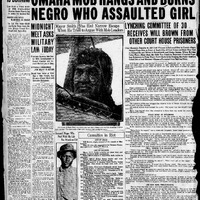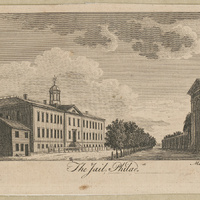 Remembering a dark past, renewing resolve for the future (2019) Remembering a dark past, renewing resolve for the future (2019) |
|
This article from the Omaha World Herald describes Omaha's official observance of the 100-year anniversary of the lynching of Will Brown. Omaha Mayor, Jean Stothert, spoke at the commemoration calling Will Brown's lynching one of the darkest days in our history.
|
 Terry v. Ohio (1968) Terry v. Ohio (1968) |
|
Terry v. Ohio is the landmark Supreme Court case that established the basis for stop and frisk policies. These policies disproportionately affect Black people and lead to the disproportionate incarceration of Black Americans.
|
 The Carceral State: Legal Histories of American Unfreedom The Carceral State: Legal Histories of American Unfreedom |
|
This teaching module discusses race, the carceral state, and the criminalization of Blackness, featuring a webinar with legal historian Taja-Nia Henderson.
|
 The Lynching of Will Brown (1919) The Lynching of Will Brown (1919) |
|
The day after the lynching of Will Brown, the Omaha Bee devoted the first two pages of its edition to the racial terror violence enacted by a mob of white Omahans. The articles on these pages provide different perspective of the race riot, from the crowds cheering at the destruction of government buildings, to the alleged assault victim's shock at the incident. The newspaper also featured a list of victims of the mob.
|
 Undesirable Aliens Act (1929) Undesirable Aliens Act (1929) |
|
This act made unlawfully entering the U.S. a crime for the first time. Immigrants who did not cross the border through an official point of entry, where they had to pay a fee and submit to tests, could be charged with a misdemeanor crime, facing fines and up to a year's imprisonment. Returning to the U.S. after deportation was made a felony, punishable by $1,000 in fines and up to two years imprisonment. This law applied to all immigrants entering the U.S., but was intended to restrict immigration from Mexico.
|
 Walnut Street Prison (1789) Walnut Street Prison (1789) |
|
An etching of the Walnut Street Prison in Philadelphia. Established as a city jail in 1773, it was expanded in 1790 to become the first state penitentiary in the new country. This prison was among the first to feature individual cells and was built to accommodate work details. The penitentiary was noted to have a larger percentage of Black inmates than white, noting the racialization of incarceration in the United States. The prison was in operation until 1838.
|
 Webinar - Latina/os and Criminal and Immigration Law Enforcement (2025) Webinar - Latina/os and Criminal and Immigration Law Enforcement (2025) |
|
In this webinar, Professor Kevin R. Johnson of the University of California, Davis, discusses the history of criminal and immigration law enforcement of Latina/os in the U.S with Dr. Donna D. Anderson and her And Justice For All class.
|
 Webinar - The Carceral State: Legal Histories of American Unfreedom (2024) Webinar - The Carceral State: Legal Histories of American Unfreedom (2024) |
|
In this webinar, Professor Taja-Nia Henderson of Rutgers Law School discusses race, the carceral state, and the criminalization of Blackness with Professor Danielle Jefferis of the University of Nebraska College of Law and our And Justice For All class.
|
 Yarborough v. Alvarado (2004) Yarborough v. Alvarado (2004) |
|
In this case, the Supreme Court overturned a Ninth Circuit Court of Appeals ruling that stated that youth and inexperience with law enforcement should be accounted for when evaluating custody. In the majority opinion, the Supreme Court held that previous rulings had rejected reliance on factors such as age and inexperience in custody analysis.
|
 Remembering a dark past, renewing resolve for the future (2019)
Remembering a dark past, renewing resolve for the future (2019) Terry v. Ohio (1968)
Terry v. Ohio (1968) The Carceral State: Legal Histories of American Unfreedom
The Carceral State: Legal Histories of American Unfreedom The Lynching of Will Brown (1919)
The Lynching of Will Brown (1919) Undesirable Aliens Act (1929)
Undesirable Aliens Act (1929) Walnut Street Prison (1789)
Walnut Street Prison (1789) Webinar - Latina/os and Criminal and Immigration Law Enforcement (2025)
Webinar - Latina/os and Criminal and Immigration Law Enforcement (2025) Webinar - The Carceral State: Legal Histories of American Unfreedom (2024)
Webinar - The Carceral State: Legal Histories of American Unfreedom (2024) Yarborough v. Alvarado (2004)
Yarborough v. Alvarado (2004)